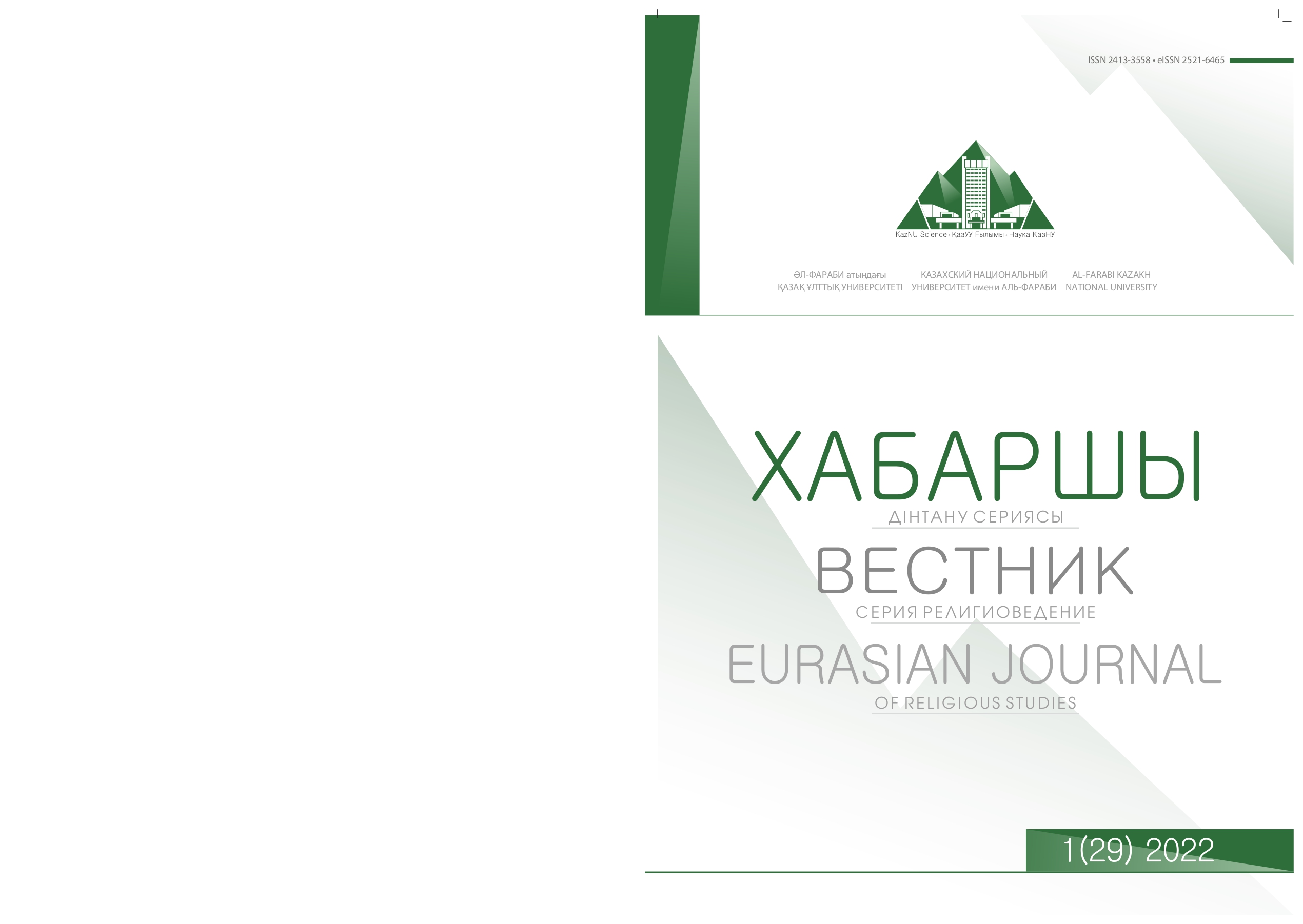Мәдени білім мен құндылықтарды қалыптастырудағы діннің маңызы
DOI:
https://doi.org/10.26577//EJRS.2022.v29.i1.r6Кілттік сөздер:
мәдениет, құндылық, бірегейлену, фактор, мәдени зерттеуАннотация
Бұл мақалада дін мәдениеттің және қоғамның барлық салаларын қамтитын және қалыптастыратын кең ауқымды институт ретінде беріледі. Автор діннің мәдени бірегейліктің қалыптасуына, әлемдік өркениет кеңістігінде мәдениетінің дамуына шешуші әсер етуге қабілетті екенін алға тартады. Дін негізінен мәдениеттің жалғасу факторы ретінде мәдениеттің қалыптасу үдерісінде беріледі және осы тұрғыдан мәдениетте құндылыққа ие болады. Діни дәстүрлер шеңберінде тұрақтылықты қамтамасыз ету үшін адамзаттық құндылықтарды қолдау мүмкіндігі зор болғанымен, діннің күрделі, көп өлшемді институционалдық құбылыстар ретінде берілуі өте маңызды. Демек, дін мен мәдениет құндылықтарының арақатынасында тәжірибелер контекстін талдау керек. Осы тұрғыдан алғанда, діни көзқарастардың тұрақтылық үшін жүйелік өзгерістер теориясын жеделдетуге қалай ықпал ете алатындығын береміз. Мақалада дін мен мәдениет құндылықтарының арақатынасы туралы білімді жетілдіруге бағытталған тұрақтылықты зерттеудің негізгі қағидалары беріледі. Нәтижелер диссоциативті континуумды қолдайды, ол тек диссоциацияны ғана емес, сонымен қатар кеңейтілген сана ұғымдарына қатысты тұтастықты да қамтиды. Мәдени зерттеулер барысында белгілі мәдениеттің нақты компоненттерін, мәдени бірегейліктің әлеуетін қамтитын тенденциялар анықталады. Мәдени бірегейлік мәселесін оның ерекшелігі тұрғысынан реттейді.
Түйін сөздер: мәдениет, құндылық, идентификация, фактор, мәдени зерттеу
Библиографиялық сілтемелер
Agapova V.N. (2018) Cultural values and methods of their classification: philosophical and cultural aspect//Philosophy and Culture.No. 9. - P. 1 - 5. DOI: 10.7256/2454-0757.2018.9.27259.
Bomberg E, Hague A (2018) Faith-based climate action in Christian congregations: mobilisation and spiritual resources. Local Environ 23:582–596. https://doi.org/10.1080/13549 839.2018.14498 22
Christie I, Gunton R, Hejnowicz AP (2019) Sustainability and the common good: Catholic social teaching and ‘integral ecology’ as contributions to a framework of social values for sustainability transitions.
Everard M, Reed MS, Kenter JO (2016) The ripple effect: Institutionalising pro-environmental values to shift societal norms and behaviours. Ecosyst Serv. https: //doi.org/10.1016/j.ecose r.2016.08.001
Fossey K (2003) Buddhist faith statement. In: Alliance of religions and conservation. http://www.arcwor ld.org/faiths .asp?page.
Gifford R, Nilsson A (2014) Personal and social factors that influence pro-environmental concern and behaviour: a review. Int J Psychol 49:141–157
Groot JIM, Steg L (2007) Value orientations to explain beliefs related to environmental significant behavior: how to measure egoistic, altruistic, and biospheric value orientations. Environ Behav. 330–354
Haluza-Delay R (2014) Religion and climate change: varieties in viewpoints and practices. Wiley Interdiscip Rev Clim Change 5:261–279. https ://doi.org/10.1002/wcc.268
Hand CM, Van Liere KD (1984) Religion, mastery-over-nature, and environmental concern. Soc Forces 63:555–570
Hartland Narayanan V (2001) Water, wood, and wisdom: ecological perspectives from Hindu traditions. Daedalus 4:179–206
Hawcroft LJ, Milfont TL (2010) The use (and abuse) of the new environmental paradigm scale over the last 30 years: a meta-analysis. J Environ Psychol 30(2):143–158.
Hedlund-de Witt A (2012) Exploring worldviews and their relationships to sustainable lifestyles: towards a new conceptual and methodological approach. Ecol Econ 84:74–83. https://doi. org/10.1016/j.ecole.
Hitzhusen GE, Tucker ME (2013) The potential of religion for Earth Stewardship. Front Ecol Environ 11:368–376. https ://doi. org/10.1890/12032 2
Ives CD, Fischer J et al (2017) The self-sabotage of conservation: reply to Manfredo et al. Conserv Biol 31:1483–1485. https://doi. org/10.1111/cobi.13025
Ives CD, Kendal D (2014) The role of social values in the management of ecological systems. J Environ Manag 144:67–72. https://doi. org/10.1016/j.jenvm an.2014.05.013 Johnston L (2013) Religion and sustainability: social movements and the politics of the environment. Routledge. London.
Kidwell J, Ginn F, Northcott M, Bomberg E, Hague A (2018) Christian climate care: slow change, modesty and eco-theo-citizenship. Geo Geograph Environ. https ://doi.org/10.1002/geo2.59.
Kluckhohn FR, Strodtbeck FL (1961) Variations in value orientations. Row, Peterson, Oxford, England.
Manfredo MJ, Bruskotter JT, Teel TL et al (2017) Why social values cannot be changed for the sake of conservation. Conserv Biol 31:772–780. https ://doi.org/10.1111/cobi.12855.
Martin J-L, Maris V, Simberloff DS (2016) The need to respect nature and its limits challenges society and conservation science. Proc Natl Acad Sci 113:6105–6112.
Pew Research Centre (2017) The changing global religious landscape. http://www.pewfo rum.org/2017/04/05/the-chang ing-globa l-relig ious-lands cape/.
Reckwitz A (2002) Toward a theory of social practices: a development in culturalist theorizing. Eur J Soc Theory 5:243–263. https: //doi. org/10.1177/13684 31022 22254 32.
Rolston H (2006) Caring for nature: what science and economics canʼt teach us but religion can. Environ Values 15:307.
Saroglou V, Delpierre V, Dernelle R (2004) Values and religiosity: a meta-analysis of studies using Schwartz’s model. Personal Individ Differ 37:721–734. https ://doi.org/10.1016/j.paid.2003.10.005.
Schwartz SH (1992) Universals in the content and structure of values: Theoretical advances and empirical tests in 20 countries. In: Zanna M (ed) Advances in experimental social psychology, vol 25. Academic, Orlando, pp 1–65.
Shove E (2010) Beyond the ABC: climate change policy and theories of social change. Environ Plan A 42:1273–1285. https://doi. org/10.1068/a4228 2.
Stern PC (2000) Toward a coherent theory of environmentally significant behavior. J Soc Issues 56:407–424.
Sustain Sci Cooper N, Brady E, Bryce R, Steen H (2016) Aesthetic and spiritual values of ecosystems: recognising the ontological and axiological plurality of cultural ecosystem “services”.Ecosyst Serv 21:218–229. https: //doi.org/10.1016/j.ecose r.2016.07.014 de
Sustain Sci Kenter JO, Associa S, Science M (2014) The deliberative value formation model. Ecosyst Serv. https ://doi.org/10.1016/j.ecose r.2016.09.015.
Van Riper CJ, Landon AC, Kidd S et al (2017) Incorporating sociocultural phenomena into ecosystem-service valuation: the importance of critical pluralism. Bioscience 67:233–244. https ://doi. org/10.1093/biosc i/biw17 0.
Van Riper CJ, Winkler-Schor S, Stamberger L, Keller R, Braito M, Raymond CM, Eriksson M, Golebie E, Johnson D (2019) Integrating multi-scale values and pro-environmental behavior in a protected area.
Washington Kendal D, Raymond CM (2019) Understanding pathways to shifting values over time in the context of social-ecological systems.
Woodhead L, Partridge C, Kawanami H (2016) Religions in the modern world: traditions and transformations. Routledge, Abingdon.













